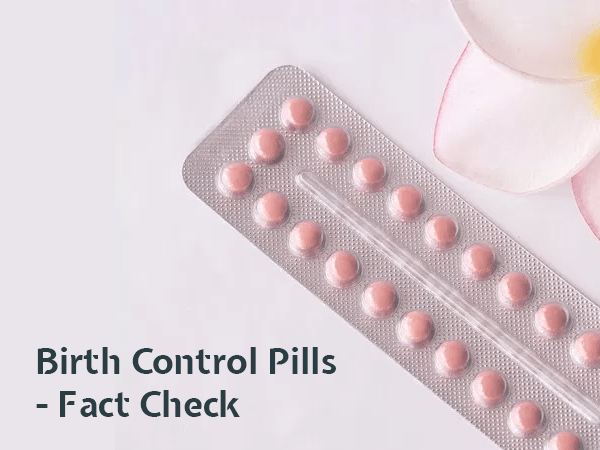
Some women who seek family planning incorrectly believe that using COCs (Combined Oral Contraceptive Pills) will cause will harm their fertility and reproductive health in the long run. On the other hand, girls and women popping Emergency contraceptive pills frequently may not be advisable.
Gynecologists also prescribe daily contraceptive pills course for a long term and effective contraception for couples who are not planning pregnancy.
Here, we take a reality check and bust some myths related to oral contraception.
Myth 1– Some women believe birth control pills will cause birth defects in their babies or will harm their infertility in the long run.
Fact 1 – Good evidence shows that COCs will not cause birth defects and will not otherwise harm the fetus if a woman becomes pregnant while taking COCs or accidentally starts to take COCs when she already pregnant .
Myth 2: Oral Contraceptive pills can cause Cancer. Some women who seek family planning believe that combined oral contraceptives (COCs) cause cancers such as breast cancer, uterine cancer, and ovarian cancer.
Fact 2: The use of combined oral contraceptives (COCs) is proven to decrease the risk of two gynecological cancers (ovarian and endometrial).
Use of COCs helps protect women from two kinds of cancers—cancer of the ovaries and cancer of the lining of the uterus (endometrial cancer).
This protection continues for 15 or more years after stopping use.It is difficult to know the effect of COC use on breast cancer and cervical cancer. The possibly increased risks that have been recorded in some studies are not large enough to outweigh benefits or to change current practice.
Myth 3 – Contraceptive pills cause Breast cancer
Fact 3 – Research findings about COCs and breast cancer are difficult to interpret. In studies, breast cancer is slightly more common among women using COCs and those who have used COCs in the past 10 years than among other women. Scientists do not know whether or not COCs actually caused the slight increase in breast cancers. It is possible that the cancers were already there before COC use but were found sooner in COC users. Both COC users and women who do not use COCs can have breast cancer.
Myth 4 – Contraceptive pills cause Cervical cancer
Fact 4 – Cervical cancer is caused by certain types of Human Papilloma Virus (HPV). HPV is a common STI (Sexually Transmitted Infection) that usually clears on its own without treatment, but sometimes persists. Use of COCs for five years of more appears to speed up the development of persistent HPV infection into cervical cancer. The number of cervical cancers associated with COC use is thought to be very small. If cervical screening is available, providers can advise COC users—and all other women—to be screened every three years (or as national guidelines recommend) to detect precancerous changes in the cervix, which can be removed.
Myth 5 – Some women believe that COCs cause hair loss (alopecia), asthma, and headaches.
Fact 5 – A woman may experience short term side affects associated with use of combined oral contraceptive (COCs), including changes in bleeding patterns, headaches, and nausea. However such side effects are not a sign of illness, and usually stop within the first few months of using COCs. For a woman whose side effects persist, give her a different COC formulation. In women who are otherwise well, COC use may be continued for many years as there are no adverse effects related to long-term use.
In fact, there are also long-term non-contraceptive health benefits of using COCs. They are –
- Help protect against cancer of the lining of the uterus (endometrial cancer)
- Help protect against cancer of the ovaries.
- Help protect against symptomatic Pelvic Inflammatory Disease(PID)
- May help in protecting against ovarian cysts.
- May help in protecting against iron-deficiency called as anemia
- Reduces menstrual cramps
- Reduces menstrual bleeding problems
- Reduces ovulation pain
- Reduces excess hair on face or body
- Reduces symptoms of polycystic ovarian syndrome (PCOD)
- Reduce symptoms of endometriosis
Myth 6 – How often and when to take the pill?
Some women who seek family planning are misinformed about how often or when they should take the pill.
Fact 6 – A woman can start using COCs any time she wants if she is reasonably certain that she is not pregnant. To be reasonably certain that a woman is not pregnant, doctors can use the pregnancy checklist.
If a woman is starting her pack of pills within five days after the start of her menstrual period, there is no need for a backup method as she is immediately protected from pregnancy.
If she starts COCs more than five days after the start of her menstrual period, she can start them any time it is reasonably certain she is not pregnant. She will need to use a “back up” method of contraception, such as a male or female condom, for the first seven days of taking pills to ensure protection from pregnancy.





,